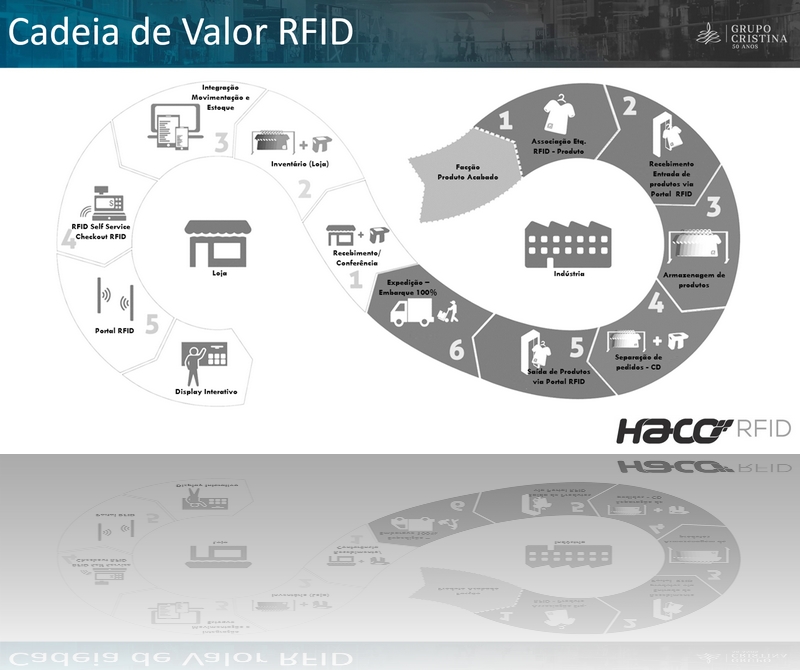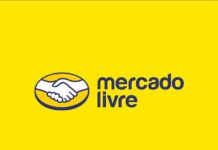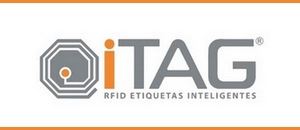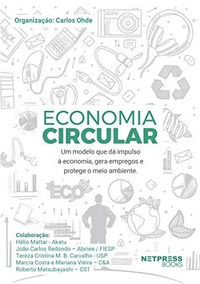Edson Perin
Grupo Cristina, Brazilian textile company in the baby and juvenile segment, which distributes its branded products in Brazil and markets in Europe, Middle East, Africa and Americas, reduced the cost of inventories and improved its business processes, using the radio frequency identification (RFID) solution implemented by Haco RFID, with GS1 standards. The company located in Blumenau, Brazilian State of Santa Catarina, had implemented RFID in the factory store, aiming to expand the technology to the entire network. The project, however, was exclusive to the retail process, thinking about replicating it in customers that do not necessarily have factories.
In inventory operations, for example, the company needed – before the RFID implementation – four people dedicated to counting the more than 20,000 items, during two or three days. With Haco’s technology, Grupo Cristina’s factory store counts with a correct rate close to 100%, much higher than that of manual counting [according to international studies, barcode inventory counts do not exceed 86 % hit], and with only one person, within a maximum period of two hours. In addition, the company eliminated invoices errors, also avoiding rework in other business processes.

The equipment in use by the establishment is currently a handheld reader Acura TLS BTL-1000, one Votu antenna and an Acura Acupad50 reader. The tags are all Haco RFID, with inlay encapsulated in a reusable fabric tag. Approximately 20,000 tags are in use, with a standard 73×19 inlay with Impinj Monza R6 chip.
Before RFID, store inventory had to be done manually with barcodes, which took around three days with a staff of four to six people, with numerous errors. The entry of goods had to be carried out through the store’s counter, blocking the front-of-the-cash operation at the time of receipt, because it required beeping item by item. The incidence of Invoices (NF) that came with the wrong item or changed to the store generated inconvenience and rework for correction. Also, locating an item in a 20,000-piece store was cumbersome and not always possible.
With RFID, the inventory is now carried out in 50 minutes with a single person and a high level of accuracy, which made it possible to carry out weekly counts. The entry of goods started to be done in front of the store in a few minutes, with the full NF. All invoices that go to the store are 100% correct, as the RFID association in the rear already identifies if there was any item exchanged and, if necessary, the correction is already made before being sent to the store. Added to these advantages, the possibility of locating an item using the RFID reader in a few minutes inside the store, finding the exact reference and model that the customer wants.

To get the perfect RFID reading, Haco carried out a site survey on the client to identify the inlay that best suited the company’s needs, due to the large volume of parts and proximity to each other on the exhibitors. The solution found was a reusable tag, attached to the magnetic anti-theft system that the customer was already using.
The middleware, which was developed by Votu RFID, was used to monitor every Invoice (NF) issued to the store’s CNPJ, to previously make the association “From/To” of the SKU (Stock Keeping Unit) references, with code EPC, from GS1. The software also serves the operation of commissioning the RFID tags, reading each SKU received in the NF, with tag recording and recording verification (scan/write/scan).
The RFID system also allows for the verification of each NF, after the complete reading of the products, and release the integration for entry into the business management system Linx ERP, with cloud database; in addition to making the store’s inventory and generating a report, flagging tags found without association, items that are positive in the system and were not found, and items that were found and are zeroed or negative in the system. Another feature of the RFID system used at Grupo Cristina allows checking the invoice at the store counter for the entry of goods that have already been checked, associated and with RFID tags already applied at the Distribution Center.
In this project, Haco RFID was the company that took over the project, mapping the process, designing how the solution would work, activating the development partners, developing the special tag for Grupo Cristina and coordinating each step, including the application of tags on parts. The relationship of many years between the companies Haco and Grupo Cristina was fundamental for its implementation.
As informed by Grupo Cristina, the change of processes to RFID, as well as any novelty, generated adaptations. However, the project was mapped for the least possible impact on the way the store already operated. Thus, the implementation became very fluid and did not require technical training or major impacts. The store front work was even made easier. Today, the process is better than the previous format and was done in such a adherent way that the store routines were minimally impacted and, in what they were, they became a more practical and easier path.



















